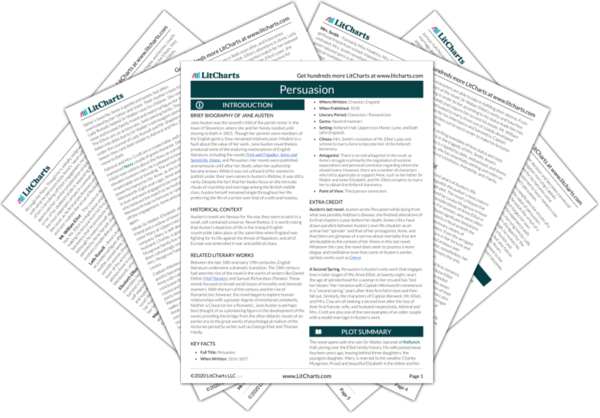Persuasion reveals the limited sphere of choice available to women in Austen’s era. In the case of the female characters, marriage represents the most viable option for a woman to live a good life. Women’s influence, in this sense, lies largely in their relation to men—to attract, reject, and accept their proposals of marriage. The comparatively sober tone of the novel results in part from the protagonist’s reality that she is past her prime; even Lady Russell, who once advised her to refrain from marrying below her station, grows concerned for Anne Elliot as she remains single years later.
There is an undeniable double standard around gender in the novel. Sir Walter Elliot and Lady Russell are both widowed, yet the narrator tells us that society would regard it as normal for Sir Walter to remarry, even as it discourages second marriages for women. Were it not for Lady Russell’s great wealth and position, she would herself be socially vulnerable as a widow. The impoverished widow Mrs. Smith reveals the plight of women who are unsupported by men or fortune.
The divergent paths of Captain Wentworth and Anne Elliot after the dissolution of their early romance also illustrate gender limitations: Captain Wentworth is able to leave the country, make his fortune, and return with even more viable marriage prospects. Indeed, when he returns to England he becomes the object of admiration of not one but three women: Louisa Musgrove, Henrietta Musgrove, and Anne Elliot. Anne, in contrast, “loses her bloom” and has no resources of mobility or occupation to heal and grow but the slow passing of time—which also reduces her marital prospects.
Gender Inequality ThemeTracker

Gender Inequality Quotes in Persuasion
More than seven years were gone since this little history of sorrowful interest had reached its close, and time had softened down much, perhaps nearly all of peculiar attachment to him,--but she had been too dependent on time alone; no aid had been given in change of place . . . or in any novelty or enlargement of society.

Unlock explanations and citation info for this and every other Persuasion quote.
Plus so much more...
Get LitCharts A+O; the years which had destroyed [Anne’s] youth and bloom had only given [Captain Wentworth] a more glowing, manly, open look, in no respect lessoning his personal advantages. . . . It was now his object to marry. He was rich, and being turned on shore, fully intended to settle as soon as he could be properly tempted; actually looing round, ready to fall in love with all the speed which a clear head and quick taste could allow.
A submissive spirit might be patient, a strong understanding would supply resolution, but here was something more; here was that elasticity of mind, that disposition to be comforted, that power of turning readily from evil to good, and of finding employment which carried her out of herself, which was from Nature alone. It was the choicest gift of Heaven; and Anne viewed her friend as one of those instances in which, by a merciful appointment, it seems designed to counterbalance almost every other want.
We [women] certainly do not forget you, so soon as you forget us. It is, perhaps, our fate rather than our merit. We cannot help ourselves. We live at home, quiet, confined, and our feelings prey upon us. You are forced on exertion. You have always a profession, pursuits, business of some sort or other, to take you back into the world immediately, and continual occupation and change soon weaken impressions. . . . All the privilege I claim for my own sex (it is not a very enviable one, you need not covet it) is that of loving longest, when existence or when hope is gone.
I will not allow it to be more man’s nature than woman’s to be inconstant and forget those they do love, or have loved. I believe the reverse. I believe in a true analogy between our bodily frames and our mental; and that as our bodies are the strongest, so are our feelings; capable of being most rough usage, and riding out the heaviest weather.











